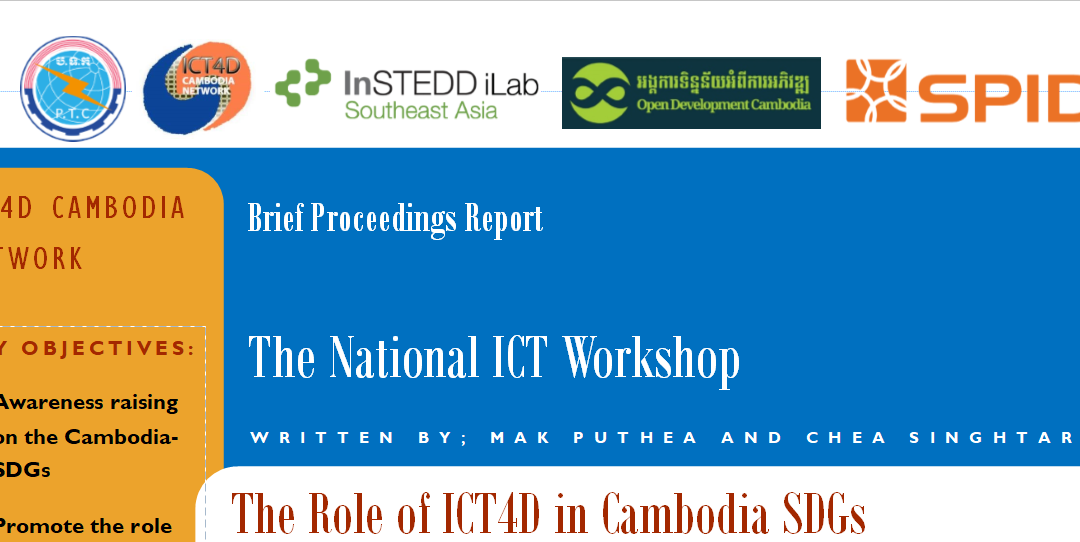Introduction
ICTs for Development (ICT4D) is currently playing a key role in strengthening good governance between public agents and its citizens through providing good public service delivery in various development sectors in the rights time, and manners. In the public and private sectors, there have significantly increased numbers of technology-led development projects in Cambodia brought about changes in knowledge, technical know-how to, and/or integrate ICTs into their development projects to make better impacts and improve its community lives in term of access to adequate information and improving decision-making processes. In the current digital era, ICT4D assists in implementing to achieve the UN’s SDGs 2030 Agenda for Sustainable Development. It said and considered ICT infrastructure as an important cross-cutting sector ‘means of implementation’ that support the achievement of every goal and target of SDGs. “The spread of information and communications technology and global interconnectedness has great potential to accelerate human progress, to bridge the digital divide and to develop knowledge societies”, The UN’s 2030 Agenda.
Organizing the discussion platform on the Role of ICT4D in Cambodia SDGs
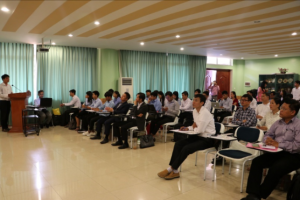
ICT4D Cambodia Network, a collaborative network project of local and international NGOs in Cambodia, currently is implemented by Open Development Cambodia (ODC). The ICT4D Cambodia Network together with the General Department of ICT of the Ministry of Posts and Telecommunications (MPTC) and the Faculty of Development Study (FDS) of the Royal University of Phnom Penh (RUPP) co-organized and restarted the 4th national ICT workshop on the Role of ICT4D in Cambodia-Sustainable Development Goals. The workshop took place on Thursday, 21st March 2019 at the RUPP and brought together 61 people from key in public—government ministries and private sectors—CSOs/NGOs, private company, media, and university students which was funded by the Swedish International Development Cooperation Agency (Sida) through the Swedish Program for ICT in Developing Regions (SPIDER).
At the opening remarks, the guest speakers delivered messages to address key policy and strategy response and the use of ICTs for making the better impact of development projects in various sectors in Cambodia. These were sharing the progress and challenges of the roles of the ICT4Development in Cambodia-SDGs in different levels—policy, implementation, and also the wills of its citizens to adapt to the technology for the thrive of the digital economy of the country in 2023.
Opening remarks
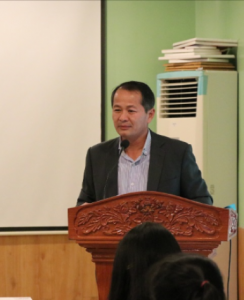
The Opening remarks, H.E. Chun Vat, Director General of Department of Information and Communication Technology of the MPTC, delivered his welcome speech and stressed the importance of Information and communications technology (ICT) in people’s lives and social and economic development in Cambodia. He also addressed some key law, policy, and strategy of the government through the MPTC, in particular, made its achievements during the 5th mandate of the Cambodian government (2013-2018). These policies were the ICT Master Plan 2020, and Telecommunication Law (adopted late 2015). The ICT and Telecommunication Development Policy 2020 is a national guideline (indicators) that will bring about using ICTs in the public sector and as well as assisting all the government’s institutions to become a digital government to promoting effectively and efficiently public service delivery through online. Thus, human resource is a must further be developed and strengthened. For instance, all Ministry’s staff at least have to have the understanding and do know how to use the computer for its administration and office works. His Excellency also addressed the fast development of technology advancement. Cambodia is now updating the latest technology, 5G, which enables the widespread and strong connectivity between the urban and rural areas. With this connectivity, it is believed that people can easily access to beneficial content and services which they can make use of it and practicing their daily lives.
“How Cambodian adapt to and using these technologies in the rights manners from its benefiting 5G, is another crucial challenge”
H.E Chun Vath, MPTC
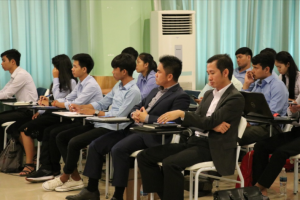

However, moving forward to become a digital economy country, Cambodia requires many efforts to be taken place and its ensuring “readiness”. (1) Building and development of ICT’s skilled workforce shall be the first priority taken serious consideration and built. (2) Building strong network infrastructure across the country making better accessibility and connectivity. (3) Development of relevant policy and strategy to upgrading digital security capacity to guaranty that either personal and business data should be more secured safely, and last but not least (4) Building collaboration and cooperation among the government, CSOs/NGOs, startups, and entrepreneurs to bring about strong ICT’s ecosystems for sustainable technology contribute to poverty reduction and prosperity in the future.
H.E. has given the final word to urge especially, youth, to learning and upgrading their professional skills, and adapting to upcoming technology for making better their own lives and contributing to the growth of socio-economic development of the country.
His Excellency said that according to study, over 80 percent of the population have been using large internet-bandwidth not for development purposes but only for social networking, entertaining, and enjoying.
Panel Discussion
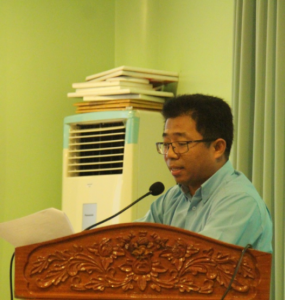
At the panel discussion session, it was prepared and combined together public and private sectors in one panel discussed the current status of “Cambodia’s Sustainable Development Goals (CSDGs) and how ICT4Development solve social needs among key public and private sectors in Cambodia”. The session was also moderated by expertise in the field of media and has long experienced in moderating such public forums in Cambodia. Mr. Nop Vy, Media Director of the Cambodian Center for Independent Media (CCIM) enjoyed taking part in the panel discussion, which involved many keys in public and private actors to share their thoughts and experiences.
There were totally 9 panelists who represent 5 public sectors, including the Ministry of Planning (MoP), the Ministry of Public Works and Transport (MPWT), the Ministry of Posts and Telecommunication (MPTC), the Ministry of Commerce (MoC), the Ministry of Education, Youth and Sport (MoEYS). Another 4 are from civil society organizations (CSOs) such as Kampuchean Action for Primary Education (KAPE), InSTEDD iLab South Asia, Open Development Cambodia (ODC), and Cooperation Committee for Cambodia (CCC). These public ministries shared each policy and strategy response and as well as experienced in the use of ICTs for each development sector, while the CSOs/NGOs presented its experience on the use of ICT4Development in various sectors. The discussion focused mainly on the efforts of the government to make it connectivity between urban and rural area through building strong network infrastructure across the country. Without connectivity, accessibility to technology and access to adequate information is still a crucial concern. So that, the MPTC was urged by other ministries and CSOs/NGOs to ensure and speeding up its expanding of network infrastructure, in particularly, high-broadband internet in the rural area.
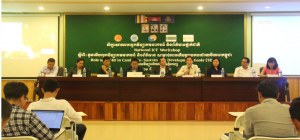
Public Sectors
There have many many mobiles and web-based applications been developed and deployed within the public and private sectors because they are realized the significance importance of using technology for access to information and improving social accountability through public service delivery in between public’s officials to its citizens and reducing face-to-face systems made by some corrupted officials and agents.
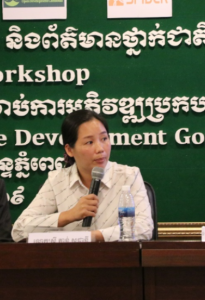
Ms. Tan Sodany, Director of ICT Policy Department, the MPTC briefly explained about Cambodia Sustainable Development Goals (CSDGs) and the importance of ICT in CSDGs. There are 17 sustainable development goals (SDGs). However, there has not mentioned about ICT for development in those 17 goals. Thus, ICT is a mechanism to reach any goal. She continued addressing some ICT’s best-practices in Cambodia contributed assisting to boost productivity and quality for Cambodian small and medium enterprises (SMEs) to supply the market demand through deploying, utilizing, and upgrading technology due to the reason of regional competition and globalization. She urged to address widely about “Women in ICTs” either public or private sectors to offer more opportunity to women in participating in the sustainable development of Cambodia. Regards with policy and strategy plan, one (1) of the MPTC’s main strategic plan for 2020 is to establish dynamic and strong connectivity and its implementation in pursuing the Cambodia-SDGs (T-ICT Development Policy 2020). The ministry aims to strengthen Internet infrastructure with high-speed internet coverage all over the country in 2020, and as well as human resource development at least 95 percent of government’s staff at ministry level and 75 percent at sub-government to be capable to use basic computer software program.
“Why SDGs has not mentioned ICT for development? Because ICTs is a means or tools use to achieve those SDGs”.
Ms. Tan Sodany, MPTC
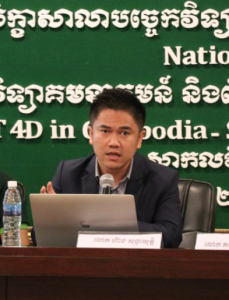
Mr. Heang Sotheayuth, Director of Information Technology and Public Relations, the MPWT, presented achievements has been made by the MPWT and numbers of applications has been doing and implementing so far such as Road Care Mobile app, MPWT News app, Cambodia Driving Rule app, Automation Vehicle Checking system, Vehicle Registration system, and QR code on vehicle plate system. This is one of the leading government institution in adopting ICTs has also set in-plan for the next five (5) years to strengthening its better public service delivery through various upgrading of existing and upcoming applications as such as Road Care app, Special Vehicle Plate, Ministry Web Portal, Counseling and information Dissemination, Data Centre, Port information Transmission and etc.
“Even though the registration system of MPWT was upgraded from a manual system where registration took 30days to an automated online system where it takes only 3 days people still complain”
Mr. Heang Sotheayuth, MPWT

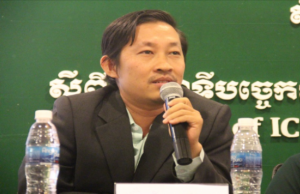
It’s also similar to MoEYS that it has been adopted ICTs in its education system since 2004. Mr. Om Chandara, Deputy Director of Information Technology of the MoEYS shared the recent ministry’s policy and strategy for ICT in education (2018-2022) focuses on four main parts which are network infrastructure and connectivity (hardware and software), Learning and teaching through ICTs (e-Learning), Strengthening good governance and management through ICT, and development of human resource (Capacity building in ICT). The MoEYS has recently also launched a BEEP program that supports people who drop out of schools to catch up with education through the online and offline applications. The ministry also addressed the exciting one is the initiative on the New Generation School (NGS) which allows students to have an ICT classroom environment from primary schools. Therefore, many systems consisting of web and mobile-based platforms in education have been developed and currently ongoing implementing by the MoEYS.
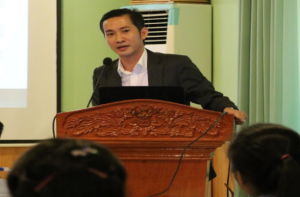
The MoP and the MoC address its separated ICT master plan is to build its own Data Centre, which contains every information provided by the ministry. Mr. Kun Dirang, Deputy Director of the Registration Department said that the MoC currently has three (3) significant initiatives system for the public such as Intelligent Property Right Registration, Certificate of Orin Registration and Business Registration system. There is seen the growth of business registration processed online after launching made it comfortable, time efficient-effectiveness, and eliminating error-manually systems.
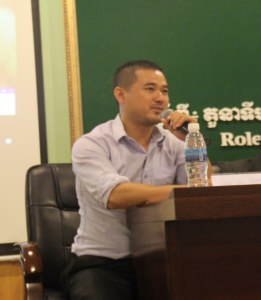
Mr. Buoy Somethea, Director of Department of General Secretariat of the National Science and Technology Council of the MoP. The MoP is currently working on the National Census in 2019 and the ICT master plan 2019-2025 focusing on four main points and 2 of which are Research and Development (R&D) management system (infrastructure) and R&D information dissemination system. The MoP strongly considers enhancing ICT into the importance of R&D regarding how it can boost innovation and creativity.
Private Sectors
Contributing to building a culture of using ICTs for better living, numbers of ICT-CSOs/NGOs projects have been playing important role in building close collaboration with relevant ministries to mainstream and develop technology for tackling various social and development issues.
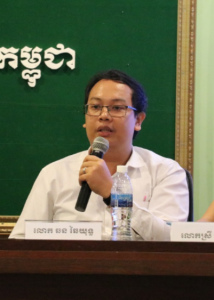
Mr. Chhorn Chhayyuth, Monitoring, and Evaluation/Education Technology Coordinator stressed the importance of a new language in the 21st century, the global is currently focused. The New Generation School project is being implemented by KAPE and InSTEDD iLab Southeast Asia in collaboration closely with the MoEYS. The project plays a vital role in mainstreaming the use of ICT for education in Cambodia. For example, they tried to employ technology in the teaching environment to promote reading in primary school through the Khmer Writing app. They also promoted an ICT learning environment in middle schools such as classroom experiments, and research and development (R&D). To accomplish this, they need to train teachers on how to teach and educate students on how to learn with ICT. KAPE also included computer literacy and coding language at the middle school level so that students can learn to identify and solve the problem.
“You might have heard about English, Spanish, and Chinese were the top priority language the world has been studying, but you may forget the important one in the 21st century, The Coding language”
Mr. Chhorn Chhayyuth, KAPE

Ms. Suy Channe Lan, Regional Lead of InSTEDD iLab South East Asia. InSTEDD established an Innovation Lab in Cambodia which aims to develop an innovative idea to help and solve health, education and other social issues. One among the successfully implemented project and in partnership with the Ministry of Health through the Communicable Disease Control (CDC) developed a 115 hotline platform using interactive voice response (IVR) system for the public to report about outbreak diseases. People can dial 115 to report any unusual case about animal disease. With support from SPIDER, InSTEDD creates ICT4D Incubation Program to support social CSO/NGOs to define, prototype, and develop technology for social needs. Besides the Khmer Writing app and another counseling app, Trey Visay app is currently handed over to the MoEYS, developed through the ICT4D Incubation program by working closely between InSTED-KAPE and under collaboration with the MoEYS to respond career counseling program that helps students to find their career path and the job market.
“The entire role of CSOs/NGOs is to work complementary with the government to solve social development issues in Cambodia. A possible collaboration brings a positive change”.
Ms. Suy Channe Lan, InSTEDD iLab SEA
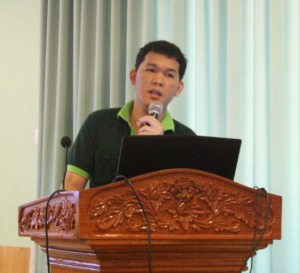
Mr. Prum Punwath, Data Research and GIS Coordinator of ODC introduced the definition of the Open Data, and how it contributes to enhancing transparency and accountability for development through access to information. ODC has been a unique working to promote the “Open Data society” through its website, a one-stop-shop to look for available data/information on various development issues in Cambodia. He also addressed the importance of data is part of it. The inter-connected between data and ICTs makes it easily accessible to adequate information at the right time. However, without data, how effective technology it is? Thus, technology needs data. He moved on to explain how ODC has been working to collect data/information and other resources in a package from any reliable sources either government or CSOs/NGOs and published it on the ODC website (Picture).
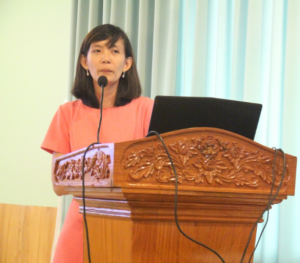
Ms. Sin Putheary, Head of Communications and Members of Development Cooperation Committee for Cambodia (CCC) first introduced CCC, a membership NGO of more than a hundred, which aims at building governance institution to CSOs and its experience in multi-stakeholder engagement and inclusive partnership between the government and CSOs/NGOs, promoting participatory good governance. She also mentioned the numbers of Cambodian non-government organizations and civil society currently existed almost 5,000 CSOs/NGOs but it does not know exactly which one alive (active) or die (inactive). This data was based on the data registered in the Ministry of Interior (MoI), the Ministry of Foreign Affairs and International Cooperation, also the Ministry of Labour and Vocational Training. In 2019, CCC in collaboration with the MoI is currently working together to compile and update CSOs/NGOs’ directory in Cambodia. Thus, this highly relies on the use of ICTs. CCC is glad to share with others once it is done.


